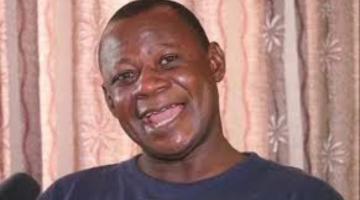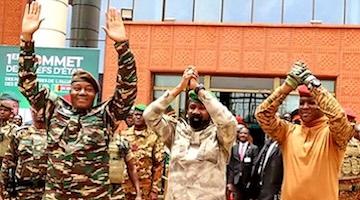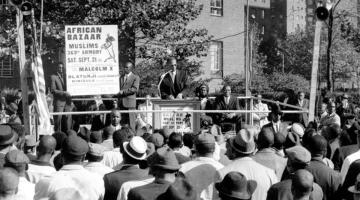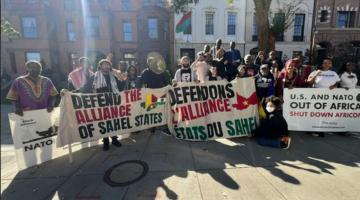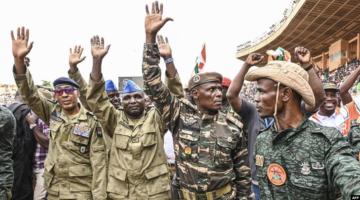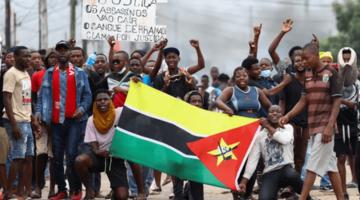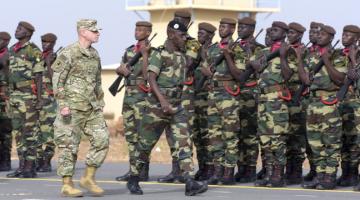“The last thing any African in the US wants or needs is the prospect of death in pursuit of a corporate agenda in Africa.”
In black barbershops across the U.S. where old school brothers talk trash about sports and beg young bloods to either comb or shave the tops of their nappy fades, there may be little knowledge of goings-on in Africa. There is however concern and bewilderment in those shops about the death of Sgt. La David T. Johnson in Niger last month.
America’s African community is drenched with its own blood, spilled during military conflicts instigated by an empire that uses soldiers drawn from the ranks of the poor and communities of color as cannon fodder. Like the Buffalo Soldiers who were ordered to kill Indians, Johnson is but the latest to be used and killed for an agenda his people did not set. In 1965 almost 25 percent of those who died in combat in Vietnam were African-descended soldiers. In 2003 blacks accounted for nearly 20 percent of deaths in Iraq. But the poignancy and special tragedy of Johnson’s death is that it occurred in Africa, the young man’s ancestral homeland. Not only is this fact not lost on the brothers in the barbershop, the Pentagon must also have long been concerned about the implications of sending latter-day Buffalo Soldiers to Africa.
“The first person appointed to head AFRICOM was Kip Ward, a black man.”
When U.S. Africa Command (AFRICOM) was established nearly a decade ago, the optics of the U.S. expanding its military presence in Africa must certainly have been a primary concern. Consider the evidence. The first person appointed to head AFRICOM was Kip Ward, a black man. Also, there were determined but unsuccessful efforts made to persuade any country to host AFRICOM headquarters in Africa rather than its ultimate location in Germany. Finally, the unstated objective of AFRICOM appears to be avoidance of U.S. casualties by training and directing Africa’s armies to act as proxies that carry out combat missions to ensure that Africa remains stable and conducive to the exploitative operations of major western corporations. For that reason great care has been taken to ensure that AFRICOM is not perceived as paternalistic. Specifically, the military forces of African countries are referred to as “partners” to incorrectly imply an equal relationship between the U.S. and African governments.
The nightmare scenario for AFRICOM is that U.S. soldiers of African descent and the communities from whence they come will not only see through the illusion and become aware of how they are being used as pawns, but they will also sympathize and empathize with some of the people who have been targeted by AFRICOM operations. For example, in the early years of the 21st Century when militant activists in Nigeria fought against environmental catastrophes caused by western oil corporations by sabotaging oil company operations and driving down profits, the creation of AFRICOM followed in short order. Because Africans everywhere can understand real people who struggle against oil companies and other multi-national corporations, AFRICOM obfuscates its true aims and claims that it is fighting only “terrorists.”
“The nightmare scenario for AFRICOM is that U.S. soldiers of African descent sympathize and empathize with some of the people who have been targeted by AFRICOM operations.”
As AFRICOM has increased the presence of U.S. military forces in impoverished and exploited regions of Africa, it has likely made areas that had little to no terrorist activity increasingly attractive territories for terrorist recruitment. Be it al-Qaeda, ISIS or some other group, some experts believe it is much easier when U.S. soldiers are actually lurking nearby for terrorist groups to persuade poor communities that the source of their misery is the U.S. This was the last lesson that Sgt. Johnson and three other U.S. soldiers learned when, according to reports, non-combatant villagers likely set them up for the attack that ended their lives.
While AFRICOM might point to the killings of the four soldiers as another justification for its construction of a major drone base in Niger, others can, with good reason, suggest that fighting terrorists for the sake of fighting terrorists is not the primary purpose of that base. The base is located in Agadez, which is a few hours away from the town of Arlit, where French companies conduct major uranium mining operations. France is the United States’ primary partner in imperialist crime in Africa, and logic suggests the drone base is to protect uranium mining operations and not Africa’s people from terrorists. This means that if Sgt. Johnson’s mission was to build support among the locals for the drone base it is likely that he tragically gave his life for imperialist access to Africa’s uranium.
“The drone base is to protect uranium mining operations and not Africa’s people from terrorists.”
America’s African community has the capacity to resist the U.S. militarization of Africa by simply refusing to participate. Between the years 2000 and 2007 black enlistment in the U.S. military declined by 58 percent. The military’s own studies showed that the unpopularity of the Iraq war was the primary reason for this development. One young would-be recruit referenced the Hurricane Katrina disaster and said: “Why should we go over there and help [Iraqis] when the [U.S. government] can’t help us over here?” He added that the war is unnecessary. “It’s not our war. We got our own war here, just staying alive.”
The war to stay alive in America has not abated, and the last thing any African in the U.S. wants or needs is the prospect of death in pursuit of a corporate agenda in Africa. Building greater awareness of AFRICOM’s reality will ultimately cause young Africans born and living in the U.S. to decline invitations to follow the tragic path walked by Sgt. La David T. Johnson.
Mark P. Fancher is an attorney who periodically writes for Black Agenda Report. He can be contacted at mfancher(at)comcast.net.

